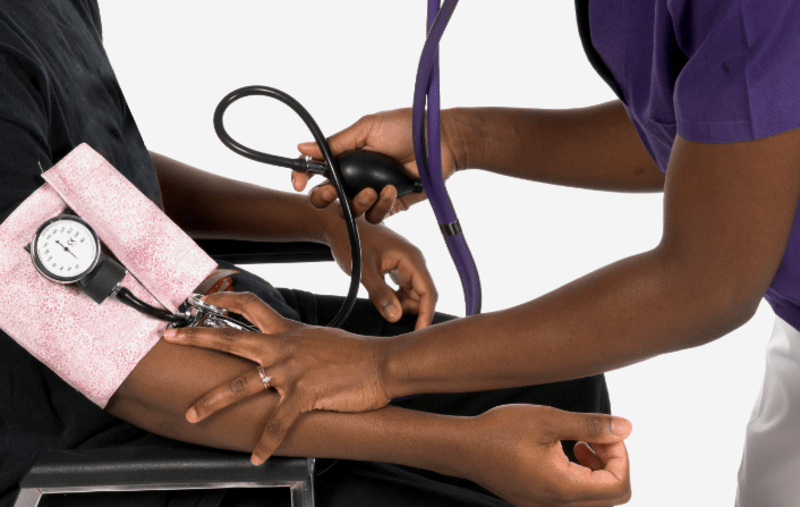Hidden dangers of hypertension: Why early detection is key

Risk factors for hypertension include older age, genetics, being overweight, physical inactivity, a high-salt diet, and excessive alcohol consumption.
Hypertension is a leading cause of premature death globally, with the World Health Organisation (WHO) estimating that around 46 per cent of adults with the condition are unaware of it. This issue is particularly pressing in low- and middle-income countries, including Kenya, where more than two-thirds of those affected reside.
In Kenya, undiagnosed high blood pressure remains a significant concern. The Ministry of Health reports that about 24 per cent of the adult population is affected, yet nearly half of these individuals are unaware of their condition.
More To Read
- WHO warns tobacco use threatens fertility in men, women
- England confirms new mpox strain: What you need to know
- Kenya urges stronger regional cooperation as transport corridors fuel disease risks across East Africa
- How Trump–Ruto health deal fills the void left after USAID exit
- Kenya, US sign Sh208 billion health cooperation deal to transform to strengthen primary care, services
- Malaria: Drug resistance and underfunding threaten progress towards eliminating killer disease
Hypertension, commonly known as high blood pressure, occurs when the force of blood against the walls of the arteries is consistently too high. This puts extra strain on the heart and can lead to serious health issues if not managed.
Dr Mukuhi Esther, a medical officer in Eastleigh, highlights that hypertension often goes unnoticed due to its lack of obvious symptoms. She emphasises the importance of regular health check-ups, particularly for pregnant women.
"Some expectant women ignore clinic visits, but without proper monitoring, hypertension may develop, and if uncontrolled, it could lead to complications, including miscarriage."
Dr Mukuhi outlines the serious consequences of untreated hypertension, such as strokes and organ failure.
"The heart has four chambers and is responsible for pumping blood throughout the body. When it is overworked, the heart muscle thickens, narrowing the arteries. This can cause fatigue and severe headaches due to reduced oxygen supply."
"When high blood pressure is uncontrolled, it weakens organ systems and can lead to further health complications, even death," she warns.
Dr Mukuhi stresses the need for proper medical management, advising people to consult healthcare professionals for appropriate treatment. "Medication should be prescribed by a doctor, not bought over the counter."
In addition to medical treatment, Dr Mukuhi advocates lifestyle changes to manage hypertension. "Avoiding alcohol and drugs is essential, along with maintaining a healthy weight and managing stress," she says.
She also warns against excessive salt intake and unhealthy fats, particularly those found in fast food, as these can significantly contribute to high blood pressure.
Several triggers for hypertension include stress, alcohol consumption, and drug use. If left unmanaged, high blood pressure can lead to severe complications.
"Untreated hypertension increases the risk of kidney problems, paralysis, and strokes," she cautions. "It’s vital to follow prescribed medication, as uncontrolled blood pressure forces the heart to work harder, which can be dangerous."
She also highlights the importance of adhering to medication to prevent complications. High blood pressure can damage the artery walls, making them more prone to plaque buildup. This can harden and narrow the arteries, restricting blood flow and increasing the risk of heart attacks and strokes.
According to the Ministry of Health, hypertension affects 30 per cent of the global population. In Kenya, the prevalence stands at 24 per cent, with a concerning 78 per cent of those diagnosed not receiving treatment. The rising rates of hypertension are attributed to unhealthy diets, sedentary lifestyles, and excessive alcohol and tobacco use.
Often referred to as a "silent killer," hypertension frequently goes undetected until it causes serious complications, making it a major contributor to cardiovascular diseases, the second leading cause of death in Kenya.
By recognising these risks and prioritising medication adherence and healthy lifestyle changes, individuals can better manage their blood pressure and reduce the likelihood of severe health issues.
Experts warn that Kenya's youthful population could face a greater burden as unhealthy diets, urbanisation, and sedentary lifestyles contribute to rising hypertension rates.
Researchers point out that many people spend much of their day engaged in sedentary activities, whether at work, in cars, or watching television. Physical inactivity increases the risk of high blood pressure by up to 50 per cent. Modern conveniences have reduced the time people spend on physical activities, making it essential to incorporate exercise into daily routines.
WHO estimates that approximately 1.28 billion adults aged 30 to 79 worldwide have hypertension, with two-thirds living in low- and middle-income countries. Around 46 per cent of those with hypertension are unaware of their condition, and only 42 per cent are diagnosed and treated.
Furthermore, just 21 per cent manage to control their blood pressure. Hypertension is a significant cause of premature death globally, and one of the WHO’s targets for non-communicable diseases is to reduce its prevalence by 33 per cent between 2010 and 2030.
Risk factors for hypertension include older age, genetics, being overweight, physical inactivity, a high-salt diet, and excessive alcohol consumption. Lifestyle changes, such as adopting a healthier diet, quitting tobacco, and increasing physical activity, can help lower blood pressure, though some individuals may still require medication.
Blood pressure is measured using two numbers: systolic pressure, which gauges pressure in the arteries when the heart beats, and diastolic pressure, which measures pressure when the heart rests between beats. Hypertension is diagnosed when systolic readings are 140 mmHg or higher, and/or diastolic readings are 90 mmHg or higher, on two separate occasions.
Risk factors for hypertension can be divided into modifiable and non-modifiable. Modifiable factors include unhealthy diets (high in salt and saturated fats), lack of physical activity, tobacco and alcohol use, and obesity. Environmental factors, such as air pollution, also play a role. Non-modifiable factors include a family history of hypertension, being over 65 years old, and having conditions like diabetes or kidney disease.
Most people with hypertension do not experience symptoms, but very high blood pressure can cause headaches, blurred vision, and chest pain. Regular blood pressure checks are vital for early detection. If untreated, hypertension can lead to serious complications, including kidney disease, heart disease, and stroke.
Severely high blood pressure (typically 180/120 mmHg or higher) can result in symptoms such as severe headaches, dizziness, breathing difficulties, nausea, and confusion. Immediate medical attention is required if these symptoms occur alongside high blood pressure.
The only way to accurately detect hypertension is through a blood pressure measurement by a healthcare professional, which is a quick and painless process. While automated devices allow for self-monitoring, professional evaluation is crucial for assessing associated risks and health conditions.
Treatment for high blood pressure generally involves lifestyle changes, such as adopting a healthy, low-salt diet, losing weight, increasing physical activity, and quitting smoking.
Top Stories Today













































